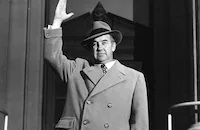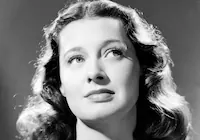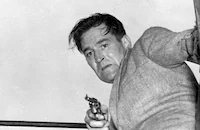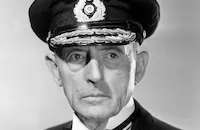Cargo to Capetown
Brief Synopsis
Cast & Crew
Earl Mcevoy
Broderick Crawford
Ellen Drew
John Ireland
Edgar Buchanan
Ted De Corsia
Film Details
Technical Specs

Synopsis
Cynical sailor Steve Conway, who has just received his captaincy papers, waits in the Dutch East Indies while looking for a ship to command. Despite misgivings about Steve's lack of command experience, businessman Singh hires him to sail the Mokara , a broken-down oil tanker, to Capetown, after more experienced captains, concerned about an approaching typhoon and the ship's state of disrepair, turn down the job. To obtain a crew, Steve starts a bar brawl and, after the participants are jailed, has them released into his custody on the condition that they sail with him. Steve must also hire a chief engineer, which is a more difficult task. Engineer Johnny Phelan, Steve's best friend, is in town, but has informed Steve of his intention to settle down and marry Kitty Mellar. Unknown to Johnny, Kitty used to be Steve's girl friend, and Steve's low opinion of her, as well as his need for a chief engineer, prompt Steve to get Johnny drunk and shanghai him aboard the Mokara . Just before the ship departs, however, Kitty boards in search of Johnny, and once she discovers what Steve has done, orders him at gunpoint to put them ashore. Steve refuses, and after taking her unloaded gun, threatens to have her jailed for attempted murder if she does not cooperate. When Johnny awakens, he is dismayed by Steve's actions, but his good nature prevails, and he agrees to serve as the engineer. Also aboard is Rik, Steve's young native friend, who wants to prove himself a good sailor. During the typhoon, the ship is pounded mercilessly, and Rik is almost crushed by a barrel. Kitty and Steve rescue him, but the youngster requires surgery. Steve decides to veer off course to take Rik to a doctor, even though he will not reach Capetown in time and will lose his job. Overcome by fever and afraid that he will ruin Steve's career, Rik tries to throw himself overboard. He is again rescued by Kitty and Steve, but the additional strain kills him. The experience brings Steve and Kitty closer together, but pressure is put on Steve's relationship with Johnny when Johnny learns that Steve shanghaied him. One afternoon, a sailor falls into an oil hold, and during the rescue, crewman Rhys attempts to kill Steve. Steve has Rhys imprisoned, and in revenge, Rhys tells Johnny about Kitty and Steve's old affair. Johnny demands that Steve marry Kitty and him the following day, and that night, Kitty declares her love for Steve, who rejects her. Kitty goes through with the marriage to Johnny, but just after the ceremony, two of the holds catch on fire, and Johnny and Steve go below to put out the fire. Johnny succumbs to the heat, but Steve saves him and extinguishes the flames. As he recovers, Johnny realizes that he is not the right husband for Kitty and releases her from their marriage. When Steve learns of this, he tells Kitty that he hated himself for letting her go, and the couple embrace.

Director
Earl Mcevoy
Cast

Broderick Crawford

Ellen Drew

John Ireland

Edgar Buchanan

Ted De Corsia
Robert Espinoza
Leonard Strong

King Donovan

Gregory Gay

Peter Mamakos

Frank Reicher
Tom Stevenson
Peter Virgo
Richard Alexander
Glenn Thompson
James Logan
Gene Roth
Dick Curtis
Ted Jordan
Teddy Mangean
Charles Sullivan
Brian O'hara
Alex Montoya
Rod Redwing
Trevor Bardette
Jack Overman
Stanley Andrews
Sven Hugo Borg
Al Hill
Mickey Simpson
Leo C. Richmond

Harry Cording
Leon Lontoc
Peter Seal
David Newell
Joseph Palma
George Barrows
Lloyd Ford
Crew
George Duning
Frank Goodwin
Lionel Houser
Lionel Houser
Charles Lawton Jr.
Jean Louis
William Lyon
Sam Nelson
Cary Odell
Morris Stoloff
Frank [a.] Tuttle

Film Details
Technical Specs

Articles
Cargo to Capetown
While there was plenty of work for him in Hollywood, Crawford was most often cast as thugs and lugs (as Marlene Dietrich's bellicose bodyguard in Seven Sinners [1940]) and lawbreakers in crime films both straight-faced (Paramount's Ambush [1939]) and light-hearted (Universal's Butch Minds the Baby [1942]). Exceptions to the rule included his clueless third wheel in the David Niven-Loretta Young romance Eternally Yours (1939) and as a grouchy good guy in Universal's comic mystery The Black Cat (1941), which also featured Alan Ladd a year before his own breakout performance as the assassin anti-hero of Frank Tuttle's This Gun for Hire (1942).
After more than a decade in the movie business (and with greater than thirty films under his belt), Crawford got the second role of his lifetime, as Willie Stark in Robert Rossen's All the King's Men (1949), a fictionalized account of the rise and bullet-ridden fall of Louisiana politico Hughie Long. Crawford would take home the "Best Actor" award the following spring at the Academy Awards® celebration and the prestige helped him land another choice part opposite Judy Holliday and William Holden in Columbia's Born Yesterday (1950). (Garson Kanin had offered Crawford the role of bullying junk dealer Harry Brock for his 1946 Broadway production; hurting for cash and holding out for fatter Hollywood paychecks, Crawford turned down the part, which went to and made a star of fellow Philadelphian Paul Douglas.)
Immediately after the end of principal photography on All the King's Men (and several months before its November 1949 release), Columbia plugged Crawford and costars John Ireland (who would lose the "Best Supporting Actor" Oscar® to Twelve O'Clock High's Dean Jagger) and Joanne Drew (ex-wife of crooner Dick Haymes, soon to be the second Mrs. John Ireland) into the shipboard melodrama Cargo to Capetown (1950).
The film was originally called The Tougher They Come, a title later grafted onto a Ray Nazarro picture starring Wayne Morris and Preston Foster, released in November 1950. At the helm was first-time director Earl McEvoy, who had put in a dozen years at Metro as an assistant director on such productions as The Picture of Dorian Gray (1945), Bad Bascomb (1946) and It Happened in Brooklyn (1947) before jumping ship and signing with MGM. McEvoy would direct just two more pictures The Killer That Stalked New York (1950) with Dorothy Malone and The Barefoot Mailman (1951) with Bob Cummings before his early retirement to Connecticut and untimely death in 1959.
Producing Cargo to Capetown was scenarist Lionel Houser. Born Lionel Francis Hauser in New York in 1908, the Stanford-educated writer worked by day as a reporter for The New York World Telegram while writing novels by night. Houser's familiarity with the crime beat won him a job scripting gangster films in Hollywood. Despite earning up to $1,000 a week, he was unhappy with the work and frustrated by his inability to graduate to more quality assignments. Turning his back on the industry, Houser hopped the steamer President Coolidge and sailed the Far East, visiting Hong Kong, Manila and Shanghai. Houser's time at sea clearly inspired Cargo to Capetown but he would not live to see the result. Less than five months before the film was released, Lionel Houser was felled by a massive heart attack and died on November 12, 1949. He was 41 years old.
Prior to its week-long run at the Pantages and Hillstreet cinemas (where it was billed with the Jungle Jim vehicle Captive Girl, starring Johnny Weissmuller and Buster Crabbe), Cargo to Capetown was previewed for critics on the Columbia lot on April 6, 1950. If the studio's expectations were low for this sea-tossed soap opera, their rewards were appropriately modest. The New York Times's Bosley Crowther found the film "only a mild adventure" and had his own little dig at statue-winner Crawford by averring that that the performances were "not in the Academy Award tradition." Fortnight noted that "no device for the titillation of juvenile reflexes is overlooked in this potpourri of derring-do" while Variety declared Cargo to Capetown only fair entertainment marred by "over-sentimental passages." The Hollywood Citizen News considered the production "O.K. for youthful minds" and Film Daily voiced the minority opinion that Cargo to Capetown offered "plenty of spectacle." While some critics lauded McEvoy for his energetic direction, most found fault with Lionel Houser's script, which was stamped "routine" and "formula" and, according to The Motion Picture Herald, was written and produced "with a minimum of imagination."
While Broderick Crawford could look forward to an immediate future in high profile starring roles in Born Yesterday, The Mob (1951) and Federico Fellini's Il Bidone (aka, The Swindlers, 1955), costar John Ireland was growing dissatisfied with his lot as a Columbia contract player. Not content to play third banana to Crawford and Glenn Ford in the prison drama One Way Out, a remake of The Criminal Code (1931) eventually released as Convicted (1950), Ireland petitioned the Supreme Court to break his contract. The actor found himself suspended by Columbia and sued by the studio, losing out on the lead role in M (1951), Joseph Losey's remake of the Fritz Lang original. The contretemps was the beginning of a lifetime of legal entanglements. Ireland soon found himself back in court answering to his ex-wife for unpaid child support and later sued the producers of the proposed Adventures of Ellery Queen series for announcing and then dropping him as its star in favor of Hugh Marlowe. Divorced from Ellen Drew in 1958, Ireland declared bankruptcy for the first time in 1959, following the failure of his Phoenix tennis club. Like Crawford, he was a scandal sheet perennial who found more lucrative work opportunities on American television in the 1950s and in European co-productions from the mid-60s on. In 1987, a 73-year-old Ireland spent $2,000 on a back page ad in The Hollywood Reporter that read: "I am an actor...PLEASE let me act." The gambit worked and Ireland was hired to replace the late Lorne Green in a Bonanza reunion telefilm that aired the following year. John Ireland died of leukemia in 1992.
Producer: Lionel Houser
Director: Earl McEvoy
Screenplay: Lionel Houser
Cinematography: Charles Lawton, Jr.
Film Editing: William Lyon
Art Direction: Cary Odell
Music: George Duning
Cast: Broderick Crawford (Johnny Phelan), John Ireland (Steve Conway), Ellen Drew (Kitty Mellar), Edgar Buchanan (Sam Bennett), Ted de Corsia (Rhys), Robert Espinoza (Rik).
BW-80m.
by Richard Harland Smith

Cargo to Capetown
Ellen Drew, 1914-2003
She was born Esther Loretta "Terry" Ray on November 23, 1914, in Kansas City, Missouri. The daughter of a barber, her family moved to Chicago when she was still an infant and she lived a very quiet childhood far removed from the glamour of Hollywood. She was encouraged by some friends to enter a beauty contest when she was just 17. After winning, she tried her luck in Hollywood, but found that they were no immediate offers for her particular talents.
She eventually took a waitressing job at C.C. Brown's, a famed Hollywood Boulevard soda fountain, and had virtually abandoned her dreams as a starlet when William Demarest, a popular actor's agent and well-known character actor, spotted her. Demarest arranged a screen test for her at Paramount, and she was promptly placed under contract for $50 a week.
For the first few years, (1936-38), Drew got only bit parts, and was often uncredited. When she finally got prominent billing in the Bing Crosby musical Sing You Sinners (1938), she decided to change her name, from Terry Ray to Ellen Drew. She earned her first major role in Frank Lloyd's If I Were King (1938) opposite Ronald Colman, yet for the most part of her career, rarely rose above "B" material and second leads. Still, she had some fine exceptions: Preston Sturges' enchanting comedy Christmas in July (1940), with Dick Powell; Tay Garnett's lighthearted war romp My Favorite Spy (1942) co-starring Kay Kyser; Julien Duvivier's taut The Imposter (1944), holding her own with a brooding Jean Gabin; and Mark Robson's chilling low-budget chiller Isle of the Dead (1945) opposite Boris Karloff. Drew made some notable television appearances in the late '50s including Perry Mason and The Barbara Stanwyck Show, before retiring from the entertainment industry. She is survived by her son David; five grandchildren; and five great-grandchildren.
by Michael T. Toole
Ellen Drew, 1914-2003
Quotes
Trivia
Notes
Lionel Houser's onscreen credit reads "Written and Produced by Lionel Houser."














